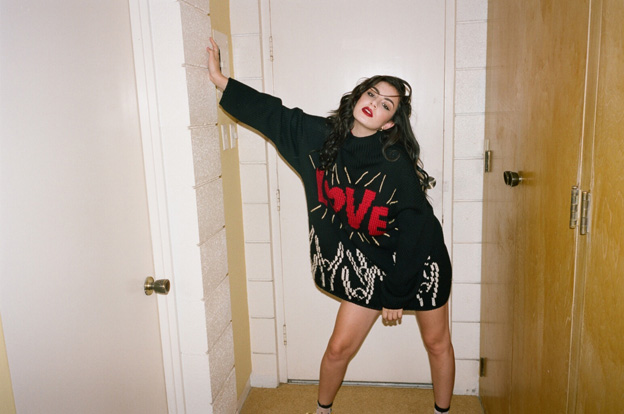
Charli XCX seems eager to get to work on the “1970s porn pad” redecoration she has planned for her new converted mansion in the English countryside, but right now she’s a bit busy. “I bought the house in June and I’ve been there four times,” the 22-year-old born Charlotte Aitchison tells me late one Saturday night in October, Skyping in from San Francisco before a sold-out show. “The first proper time I’ll spend there will be Christmas.”
She’s not exaggerating: For the next two months, up until the mid-December Stateside release of her sophomore album, Sucker, Charli will have just three days off. She’s not complaining, either. “That feels like a fucking lifetime to me,” she says, considering the free time. “I wanna get the nicest fucking hotel room in New York, and spend loads of money on ordering pizza and watching movies in bed, and just sit on a cloud with my phone off.”
When we talk, Charli’s in the midst of wrapping up a North American club tour that was initially planned to coincide with Sucker’s original October release. Then “Boom Clap”, her borderline bubblegum song for The Fault in Our Stars soundtrack, ticked its way to #8 on the Billboard Hot 100 chart, making it the pop singer/songwriter’s most successful solo single by a long shot—and putting more pressure on the album, and Charli, to achieve similar heights.
All of this—the mansion, the big soundtrack hit, the beyond-hectic schedule—comes after “that whole ‘Fancy’ thing” began this spring; Iggy Azalea’s inescapable smash, held together by Charli’s teflon hook, quickly elevated the singer from a savvy pop underdog to a bona fide star. Her 2013 debut album, True Romance, seems a distant memory now, though hardly a messy mistake of youth. That record’s glittery goth-pop felt fresh in its pre-Lorde era, but that’s three Charli XCXs ago at this point.
Since then, she’s gone from the cheerleader chants of “SuperLove”, to a punk phase spent rage-recording in Sweden, to the smart, decade-spanning pop found on Sucker. Of course, that’s not counting the work Charli’s churning out for others—like Iggy and other pop stars she can’t reveal at the moment—in the songwriting camps she continues to frequent with her cabal of A-list collaborators including Norwegian pop savants Stargate.
Charli, whose first Top 10 hit came as the songwriter behind Icona Pop’s 2013 anthem “I Love It”, says her ambitions are larger than mere success for herself, though she straight-up tells me she has no interest in fame whatsoever. “I want to have a publishing company and a record label,” she says, “and I want to manage five artists… eventually.”
For now, there’s a lot to parse within Sucker. With a sense of rebellion permeating its lyrics and nods to everything from 1990s alt-rock like Garbage and Weezer, to 1960s girl groups, to classic punk, to Charli contemporaries like Haim, it’s one of those pop albums that inspires instant nostalgia for teenagedom and all of the joy and angst that comes with it.
Pitchfork: Between Sucker’s abrasive title track and “Break the Rules”, you seem to be saying there’s more than one way to find success in the music business.
Charli XCX: I wrote “Sucker” when I was really angry, and it’s about my very cynical view of the music industry. When True Romance came out, some people still doubted me as an artist and a songwriter. But once “I Love It” appeared, and later “Fancy” and “Boom Clap”, people began to really pay attention. I find it difficult to deal with someone who rejects me and then kisses my ass later—even though I know that’s what the whole music industry is. One of the lines in “Sucker” goes, “You joined my club/ Luke loves your stuff.” People would always come up to me and say, “Oh, [Dr.] Luke loves your stuff, well done”—as if that means, “You’ve made it.” That’s fucking weird to me.
As for “Break the Rules”, I actually wrote that whilst I was at a writing camp and I never expected to write anything for myself while I was there. I went to go have a cigarette in the car park at Westlake Studios, where Quincy Jones recorded a lot of Michael Jackson’s records, and sang this idea in my phone—I still have it on there—for the chorus. Stargate and [songwriter/producer] Steve Mac were working on a beat that it fit over top, and it came together really fast. A lot of people think that single is really calculated, because it’s like a record label’s wet dream; I handed it in in June, and they were like, “This is perfect, school starts in September.” But it came so naturally and it’s very tongue-in-cheek. I’m very aware of what I’m doing. This record is very self-aware, whereas True Romance was not.
Pitchfork: You wrote parts of True Romance when you were 16, and it’s harder to be completely self-aware while you’re still growing into who you are.
XCX: I’m still so proud of True Romance, but I definitely felt like I was afraid when I wrote that record—and you can hear it. I felt nervous and was definitely worried what people would think about me. I wanted to make a pop record, but I wanted to make it “cool.” Now I couldn’t give a fuck if people don’t think I made a “cool” album.
Pitchfork: It’s funny to hear you say that because one thing you really excel at on Sucker is bridging the gap between the mainstream pop world and the “cool” pop world—you’re mixing big Top 40 producers and songwriters, like Stargate and Benny Blanco, with critical darlings like Robyn producer Patrik Berger, Cashmere Cat, Ariel Rechtshaid, and Vampire Weekend’s Rostam Batmanglij.
XCX: That’s what I aim to do as an artist. I hate the idea of people thinking that I’m just a little girl who goes into studios with pop producers, and they work their magic. I executive-produced this record myself and I put those people in a room together because I thought it would be right. A lot of artists in my position, particularly before “Fancy”, would be very afraid to work with Stargate for fear of what people would say about them. But I don’t give a fuck because I think Stargate are tight and I work really well with them—they can sit in a studio and write seven songs in a day. And Cashmere and Benny have worked together forever, they live in the same house. I want to bring those people together because I think I can make it work. I’ve always been good at never being the same thing twice, and it’s partially because I like collaboration.
Pitchfork: You also worked with Weezer’s Rivers Cuomo on the track “Hanging Around”. What was that like?
XCX: We went to the studio and he was like, “What’s your favorite Weezer song?” I said, “Beverly Hills”, and he was like, “OK, I have an idea,” and wrote the song. He sings and plays guitar on it, too. I’m very happy with how it came out.

Pitchfork: There was almost lore around Sucker before it was even announced: how you went to Sweden to make a punk record to get out your anger and then abandoned that album in favor of a more traditional pop record. But I still hear the punk bits in some of these songs.
XCX: Some of the poppier songs on the punk record are now the most punk songs on the pop record. There were some full-on, two-minute-long, me-screaming songs. There was one called “Mow That Lawn”, which is so sick. It goes, “Oooh! Baby mow that lawn/ Oooh! Really turns me on/ Oooh! Got no mobile phone/ Oooh! ‘Cause the signal’s gone.” It’s about me moving to the countryside and being bored of taking too many drugs and drinking too much, and just wanting to have a cat and mow the lawn.
That experience was therapeutic for me, because I was bored of being the girl who didn’t sing “I Love It”, even though I do fucking sing all through that song—I’m pretty audible on it. I was bored of getting requests to rewrite that song for other people. I had lost myself in the music industry and in the idea of being “the best” songwriter; I was going down a Dr. Luke road with my competitive mentality. I didn’t like it. That’s not who I am. So I went to Sweden and spoke with Patrik [Berger] and Pontus [Winnberg, aka Avant of production duo Bloodshy & Avant] about it. Pontus worked on a lot of the Britney [Spears] stuff back in the day, and I asked him, “What do you think about how I’m feeling?” He said he felt like that, like the pop world is this weird competitive environment that he wanted to get out of. Everyone in Sweden is cool, it’s not like L.A.; I got all my shit out and felt better about myself belonging in the music world.
Pitchfork: Even just based on how much you shout-out your peers on social media—Bleachers and Ryn Weaver most recently—it seems like you value a non-competitive creative community.
XCX: I don’t have time to be a bitch to people, it’s so unproductive. I know there are so many people out there—fans and artists—who think it’s cool to be a cunt, but you’re so fucking dumb if you think that’s cool. I like befriending my collaborators because I’d rather make music with people I like than people I pretend to like. I’m really at this point right now where I don’t give a fuck what anyone thinks about me: what I wear, if they think I’m too nice, if I look weird. I’m so over that. If someone is an aloof dick with me, I’ll straight-up tell them: “It doesn’t make you cool, man. Loosen up a little bit, bro.”
I’m also not embarrassed to say I’m a fan of my peers. Someone I continuously get asked about is Lorde. People love to pin us up against each other. I don’t give a fuck. I admire her greatly: She is so prolific and so kind, and is such a talent for the younger generation, and it’s so cool that she has such a platform. I hate it when I see people take that away from her, or try to get people to say bad things about her in the press. My philosophy is to treat people how you want to be treated. This whole element of competition is not on my radar.
Pitchfork: Speaking of Lorde, you recently collaborated with her on The Hunger Games: Mockingjay soundtrack, which she curated, for a song called “Kingdom” with Simon Le Bon. Are you a big Duran Duran fan?
XCX: If I’m being honest, I’m a fan, but not the world’s #1 fan. It was definitely exciting to be working with someone who’s iconic and from a different time than me, though. That was something Ella [Yelich-O’Connor, aka Lorde] felt really strong about—bringing in another time period. We spoke about a lot of different people, and Simon seemed like the right one, so we were excited when he said yes.
I also worked with Rostam [Batmanglij] on that song. We went to the Miley Cyrus show in L.A. and got really wasted. Then we went back to his house and I sat on top of his piano, and we wrote “Kingdom”. We sung it into his phone. I remember thinking in the morning, “Ugh, this is going to be the worst thing ever,” but it was really good. So when Ella reached out to me about the soundtrack, I decided to send her that song even though it’s really different than my usual shit. She was really complimentary about it.
“I know there are so many people out there—fans and artists—
who think it’s cool to be a cunt, but you’re so fucking
dumb if you think that’s cool.”
Pitchfork: Do you find that it’s gotten harder to stay private as you’ve gotten more popular? It seems like there’s this expectation among pop stars who write their own lyrics to reflect their personal lives in a way that can be voyeuristic, and ultimately feed into the cult-of-personality cycle of fame.
XCX: The thing that differentiates me from someone like Taylor Swift is that I don’t live in gossip magazines. I don’t want that. It’s not a slight on Taylor—she’s a genius—but I’m not about to date a boy-band member. I don’t have interest in fame, at all. I have an interest in people listening to my music. That’s it. I don’t want to go to a fucking fashion party. It’s hard for people to be truly voyeuristic about me because they don’t know that much about me. I’m not getting chased while buying eggs, like Iggy was the other week. I don’t even buy eggs, I can’t fucking cook! Maybe I’m being naïve, expecting that I’m going to be able to stay like that if I continue to do what I’m doing. But I’m very conscious to keep it like that.
Also, I’m very selfish when I write songs and I don’t really think about my audience. My subject matters are broad, and I’m very much a blunt songwriter. So it’s quite easy for people to apply my shit to their life. That takes the pressure off me a little bit.

Pitchfork: “Fancy” kicked off a hot streak of female collaborations at the top of the charts that’s still continuing on the Hot 100. How do you feel about that?
XCX: When Iggy’s people approached me to write the hook on “Fancy”, I felt like it was an opportunity for me to do an Eve and Gwen Stefani thing—a strong female collaboration. Don’t get me wrong, it’s awesome that the Top 10 on Billboard is controlled by females and female collaborations, from Jessie J, Nicki, and Ariana [“Bang Bang”], to Meghan Trainor [“All About That Bass”], to Iggy and Rita [“Black Widow”]. But what was different about me and Iggy’s collaboration was that there was no expectation. There was no record label plot. At that point, people still saw me and Iggy as underdogs. Neither of us had real big shit popping off, we were just doing our thing. That’s why “Fancy” worked so well: It was so genuine.
But I do think it’s cool that there are so many female collaborations right now, because the media always want to pit us against each other and make us fight for the pop crown. I’m just waiting for the next Moulin Rouge!-level collaboration—I wanna try to make that happen.
Pitchfork: Who would you cast in a “Lady Marmalade” redux circa 2014?
XCX: Me, Iggy, Gwen, Missy—she should be in it again—and maybe Rihanna. You know what I have always thought would be really cool? If Beyoncé, Lady Gaga, Rihanna, and Nicki did a song together. Everyone would fucking love it. Why won’t someone make it happen? If I were the head of a record label, that would be my priority.

